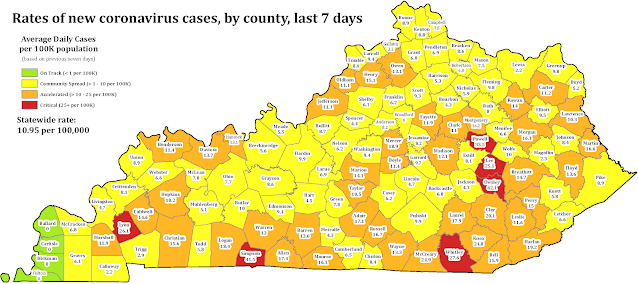State records 11th consecutive week of fewer new cases, but its positive-test and new-case averages went up a little on Sunday

State Dept. for Public Health map, relabeled by Ky. Health News; for a larger version, click on it.
—–
By Al Cross
Kentucky Health News
Two key measures of the pandemic took a turn upward Sunday, even as Gov. Andy Beshear pointed out in a Facebook post that the Monday-to-Sunday reporting week was the 11th in a row with a smaller number of new cases.
The percentage of Kentuckians testing positive for the novel coronavirus. It rose to 2.88% after staying at 2.8% for two days. The rate has been below 3% since last Sunday.
The other major metric going up was new cases of the virus. The state reported 361 new cases, 45 more than last Sunday. That brought the seven-day rolling average to 607, six higher than it was Saturday.
For the week, the initial, unadjusted daily reports of new cases totaled 4,252. The previous week’s corresponding total was 4,654.
Kentucky hospitals reported 381 Covid-19 patients, 20 fewer than the week’s average. Intensive care had 96, four more than Saturday, but the number on ventilators fell by seven to 39, a historically low share.
Kentucky’s statewide rate of new cases last week ranked 31st among the states, according to The New York Times coronavirus data tracker. The state’s daily report said the rate today was 10.95 per 100,000 residents over the last seven days, up 0.15 from Saturday’s rate of 10.8.
Counties with rates more than double the statewide rate were Owsley, 42.1; Simpson, 41.5; Powell, 33.5; Whitley, 27.6; Lyon, 26.1; Lee, 25.1; McCreary, 24.9; and Knox, 24.8.
Counties with more than five new cases Sunday were Jefferson, 84; Fayette, 34; Kenton, 13; Warren, 12; Harlan and Laurel, 11; Bullitt, 10; McCracken, Madison and Oldham, 9; Lyon, 8; Caldwell and Logan, 7; and Boone, Daviess, Henderson and Scott, 6.
The state list eight more Covid-19 deaths, five confirmed and three probable, raising the death toll to 6,031. It was the first single-digit addition to the list since Monday, Feb. 15. On weekends, the state does not itemize deaths or add to the list of those found in its ongoing audit of death certificates.
Vaccination: Two health experts said on CBS‘s “Face the Nation” that keeping up the current pace of vaccination is the key to preventing a fourth surge of coronavirus cases and Covid-19 deaths.
“If we could just get two or three more weeks” at the current national rate, that would be “a pretty good backstop against a fourth surge,” said Dr. Scott Gottlieb, a commissioner of the Food and Drug Administration in the Trump administration. He said vaccine supplies should be boosted in areas with outbreaks.
Dr. Anthony Fauci, President Biden’s chief medical adviser and director of the National Institute of Allergy and Infectious Diseases, said those outbreaks are being driven both by more contagious variants and by “pulling back on the mitigation,” as some states are doing. “I believe it’s premature.”
After weeks of decline, the U.S. has hit a plateau in cases. “Once you stay at that plateau you’re really in danger of a surge coming up, and unfortunately that’s what we’re starting to see,” even more so in Europe, Fauci said. He said travel remains risky because “you get congregation of people” in lines.
Asked how to overcome resistance to vaccination, especially among younger Republicans, Gottlieb suggested getting more vaccine into doctor’s offices and pharmacies would produce better results than messages featuring celebrities.
Dr. Sanjay Gupta said on CNN‘s “Reliable Sources” that vaccine hesitancy or resistance are being fed by “very provocative” social-media posts. The show referred to a report by NPR that said “Articles connecting vaccines and death have been among the most highly engaged with content online this year, going viral in a way that could hinder people’s ability to judge the true risk in getting a shot.”
For example, no vaccine-related deaths have been reported, but “On almost half of all the days so far in 2021, a story about someone dying after receiving a vaccine shot has been among the most popular vaccine-related articles on social media, according to data from the media-intelligence company NewsWhip,” NPR reporter Miles Parks notes.
Social-media platforms are “making more of an effort to take down patently false health claims,” Parks reports, so “bad actors are turning to cherry-picked truths to drive misleading narratives. Experts say these storylines are much harder for companies to moderate, though they can have the same net effect of creating a distorted and false view of the world.”